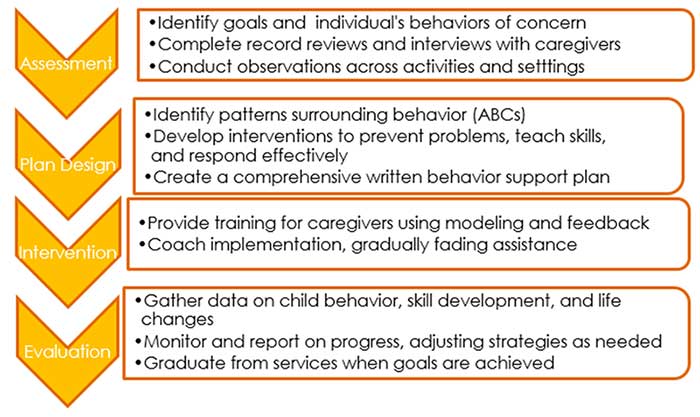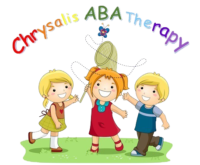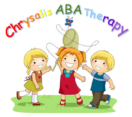Applied Behavior Analysis ABA is a science in which derived from the principles of behaviors are systematically applied to improve socially significant behavior to a meaningful degree and to demonstrate experimentally that he procedures employed were responsible for the improvement on behavior. – Cooper, 1986.
The following “red flags” may indicate your child is at risk for an autism spectrum disorder. If your child exhibits any of the following, please don’t delay in asking your pediatrician or family doctor for an evaluation:
- No big smiles or other warm, joyful expressions by six months or thereafter
- No back-and-forth sharing of sounds, smiles or other facial expressions by nine months
- No babbling by 12 months
- No back-and-forth gestures such as pointing, showing, reaching or waving by 12 months
- No words by 16 months
- No meaningful, two-word phrases (not including imitating or repeating) by 24 months
- Any loss of speech, babbling or social skills at any age
Step 1: Find an Local ABA provider.
Call your local resource Autism Center (CARD) they have a wonderful resource list of local providers by area. Ask other parents about their ABA provider. Ask your pediatrician or neurologist if they can recommend someone for your child. Ask the following questions:
- Is a Board Certified Behavior Analyst (BCBA) who will come and do the assessment?
- How often the BCBA will come to my home to train parents and staff?
- What is the background of the person who will provide one-to-one services to my child?
Make sure it is a Registered Behavior Technician with more than 2 years experience. You can ask for their resume and initial interview before they can start working with your child.
- Is parents’ training a goal?
- How often is this provided?
- If it is a waiting list, how long I have to wait before my child gets services?
- Are you in network with my insurance company?
Some providers said they take your insurance as out of network but the cost is very high for parents.
Step 2: What about Funding ABA services.
Not all insurance plans cover ABA therapy. Even though ABA benefits are state-mandated in Florida, there are some exceptions- such as plans that are managed outside of the state of Florida, or plans managed by companies with under 50 employees.
Call your insurance company and make sure ABA is covered in your policy
If your insurance does cover ABA benefits, Chrysalis ABA Therapy will contact the insurance to obtain the necessary authorizations to provide services. A deductible and max-out-of-pocket will be provide to you before setting the initial intake.
If your insurer does not cover ABA services, private plans are also available. If your son is not in a public school and hold an Individualized Educational Plan (IEP) you can apply for a state funding www.stepupforstudents.org
If you have a diagnosis and your child does not have an IEP and he is younger than 6 years old, we can help you getting an IEP and obtain funding through www.stepupforstudents.org
CAT is in network with all major insurance companies. We currently in network with: Cigna, Aetna, Magellan (Avmed), Tricare South, United, Medicaid Florida, Beacon Health Option, and Blue Cross Blue Shield. CAT will general a bill every Saturday for the copay, coinsurance and/or deductible amount due by the parent. Payment needs to be pay the following week to guarantee continuity in services. We accept Check and credit cards as a form of payment.
Step 3: Begin ABA therapy.
After obtaining an authorization from the funding source, someone will call you with tentative dates and time to start services. See What to expect?
In CAT we follow our protocol for Intake, Assessment and Follow up

Intake – The BCBA will meet with parents to explain the services and what you can expect from our services. Trainings, follow up, data collection and other topics will be discussed. This is a wonderful opportunity to ask questions. During this session, BCBA will continue asking caregivers questions about medical history, collecting important medical, prior assessments, and educational documentation. Please have those documents handy as this will help speeding the assessment process. A tentative schedule of services can be discussed during this session. The BCBA will leave a psychological assessment ABAS-3 to be completed by caregiver and child’s teacher.
Assessment – In a second visit, the BCBA and sometimes support staff will complete curriculum assessment (VB-MAPP) and functional assessment will be completed to identify child’s areas of concern and skills he needs to have to be independent in the areas of: self-care, functional communication, following instructions, social emotional and academically. Sometimes, an additional visit to the child’s school and/or home will be schedule to have a more comprehensive understanding of behavior functions.
Behavior Support Plan (BSP) – A behavior plan will be developed for your child that contains: child’s academic and medical background, functional assessment and strategies to be implemented when maladaptive behavior and replacement behaviors happened, goals for behaviors target for reduction and skill acquisition in all the domains covered under VB-MAPP assessment, Fading procedure, Parent’s fidelity data, crisis procedure and schedule proposed for your child’s ABA program by provider. The BCBA will schedule a date for services to start and you will have the opportunity to meet the staff who will work 1:1 with your child. During this session, the BCBA will cover the whole plan and both (caregiver and CAT staff will sign the BSP)
Therapy sessions – Your child will receive services under a set schedule and changes on the schedule needs to be discussed with BCBA in charge or your child’s program before implementing any changes on the schedule. Materials and data collection system will be design by the BCBA and provided it to your child’s therapy as he/she makes progress on his programs. You can follow his/her progress by login your portal. Parents would need to collect data online or by paper to guarantee implementation of strategies across environments. Services can be discontinued at any time for the following reasons:
- Individual achieves all of his or her established goals and the parent/caregiver/individual agrees that graduation from services is warranted
- Parent/primary caregiver/individual refuses to follow the mutually agreed upon treatment plan after repeated reminders and attempts to resolve barriers to implementation
- Individual ages out of coverage (e.g., at the individuals 21st birthday and/or no longer enrolled in school). Note: this applies to ABA therapy through insurance and Medicaid only; other rules vary based on funding source.
- Individual is not achieving the goals of treatment despite exhaustion of all known interventions, procedures, and research-based strategies.
- MBA staff become aware of circumstances (e.g., drug abuse, illegal activities, hostile behavior of caregivers) that may place them at risk
- Individual, parent, or guardian decides to terminate services for any reason
The first step is visit your pediatrician and share with him/her your concerns. Most insurances require a referral from your PCP to do an assessment. You need to have a cognitive assessment by a neurologist or a developmental pediatrician to get an official diagnosis of your child. Most insurances in Florida will cover ABA due to a state mandatory regulation.
The autism insurance reform law provides that a health insurance plan issued or renewed on or after April 1, 2009 must provide coverage to an eligible individual for diagnosis and treatment of autism spectrum disorder. AKA. Steven A. Geller Autism Coverage Act
Even though, Autism is mandatory in the state of Florida. Many insurances up to do not cover ABA in their policy. For example, some employers with self-funding policy can choice to include or exclude ABA in their policy. See Autism Speaks for more detail.
Mainly, Autism Spectrum Disorder (ASD) and Down Syndrome are covered under many of major insurances. Most insurances for companies with 50+ employees will cover ABA under their policy. Excludes: if they are self-funded. The employer can excludes ABA.
Since April 3rd, 2017. Florida Medicaid will cover any child from 0-21 with any diagnosis under the “Diagnostic and Statistical Manual of Mental Disorders (DSM–5)” that requires behavioral intervention as medically needed to improve the child’s independent living skills.
Note that this is only for Florida Medicaid children.
CAT is mainly providing services in our center. If your child needs services at home and in the community, our sister company MONARCH BEHAVIOR ANALYSIS, LLC can provide that services. A different Behavior Support Plan and schedule of services might need to be done.


